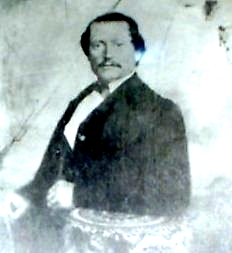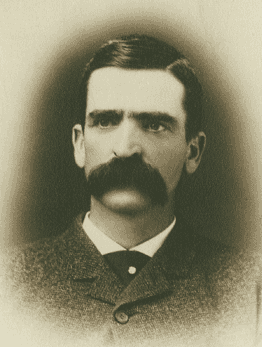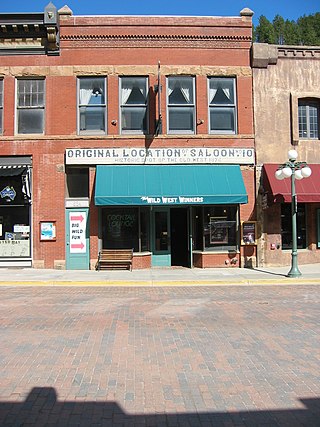External links
- Deadwood '76 at IMDb
- Deadwood '76 is available for free viewing and download at the Internet Archive
| Deadwood '76 | |
|---|---|
| Directed by | James Landis |
| Screenplay by | Arch Hall Jr. (as Arch Hall) James Landis |
| Story by | Arch Hall Jr. (as Arch Hall) (original story) |
| Produced by | Arch Hall Sr. (as Nicholas Meriwether) |
| Starring | Arch Hall Jr. Jack Lester |
| Cinematography | Lew Guinn (as Lewis Guinn Vilmos Zsigmond (as William Zsigmond) |
| Edited by | Anthony M. Lanza |
Production company | Fairway International Pictures |
| Distributed by | Fairway International Pictures |
Release date |
|
Running time | 97 minutes |
| Country | United States |
| Language | English |
Deadwood '76 is a 1965 American Techniscope Western film directed by James Landis and starring Arch Hall Jr. and Jack Lester.
A drifter, Billy May (Arch Hall Jr.) arrives in Deadwood, South Dakota. A child misidentifies him as Billy the Kid and the town turns against him. He becomes a fugitive chased by Wild Bill Hickok. He runs into his long lost father who was a Civil War Veteran for the Confederacy. His father has made friends with a tribe of Indians and admires the leadership of the elders in the tribe. He plans on joining forces and tries to get Billy to join but Billy is not interested. He is interested in finding gold and living in peace however that is not what is in store for poor Billy.
Deadwood Music by Harper MacKay Lyrics by Arch Hall Sr. Sung by Rex Holman https://www.imdb.com/title/tt0059093/soundtrack

James Butler Hickok, better known as "Wild Bill" Hickok, was a folk hero of the American Old West known for his life on the frontier as a soldier, scout, lawman, cattle rustler, gunslinger, gambler, showman, and actor, and for his involvement in many famous gunfights. He earned a great deal of notoriety in his own time, much of it bolstered by the many outlandish and often fabricated tales he told about himself. Some contemporaneous reports of his exploits are known to be fictitious, but they remain the basis of much of his fame and reputation.

John McCall ;, also known as "Crooked Nose" or "Broken Nose Jack", was the murderer of Old West legend Wild Bill Hickok. McCall shot Hickok from behind as he played poker at Nuttal & Mann's Saloon in Deadwood, Dakota Territory, on August 2, 1876. McCall was executed for the murder on March 1, 1877.

Little Big Man is a 1970 American revisionist Western film directed by Arthur Penn, adapted by Calder Willingham from Thomas Berger's 1964 novel of the same title. It stars Dustin Hoffman, Chief Dan George, Faye Dunaway, Martin Balsam, Jeff Corey and Richard Mulligan. The film follows the life of a white man who was raised by members of the Cheyenne nation during the 19th century, and then attempts to reintegrate with American pioneer society. Although broadly categorized as a Western, or an epic, the film encompasses several literary/film genres, including comedy, drama and adventure. It parodies typical tropes of the Western genre, contrasting the lives of white settlers and Native Americans throughout the progression of the boy's life.
Ray Dennis Steckler, also known by the pseudonym Cash Flagg, was an American film director, producer, screenwriter and actor best known as the low-budget auteur of such cult films as The Incredibly Strange Creatures Who Stopped Living and Became Mixed-Up Zombies. In addition to Cash Flagg, Steckler was also known by the pseudonyms Sven Christian, Henri-Pierre Duval, Pierre Duvall, Sven Hellstrom, Ricardo Malatoté, Harry Nixon, Michael J. Rogers, Michel J. Rogers, Wolfgang Schmidt, Cindy Lou Steckler, R.D. Steckler, Ray Steckler, and Cindy Lou Sutters —- this last his "porn name".

Calamity Jane is a 1953 American Technicolor Western musical film starring Doris Day and Howard Keel, and directed by David Butler. The musical numbers were staged and directed by Jack Donohue, who a year later would direct the Day musical Lucky Me (1954). The film is loosely based on the life of Wild West heroine Calamity Jane and explores an alleged romance between her and Wild Bill Hickok.
Jazzology Records is an American jazz record company and label. It is part of the Jazzology group of labels owned and operated by the George H. Buck Jr. Jazz Foundation.

Seth Bullock was a Canadian-American frontiersman, business proprietor, politician, sheriff, and U.S. Marshal. He was a prominent citizen in Deadwood, South Dakota, where he lived from 1876 until his death, operating a hardware store and later a large hotel, the Bullock Hotel.

Charles H. "Colorado Charlie" Utter was a figure of the American Wild West, best known as a great friend and companion of Wild Bill Hickok. He was also friends with Calamity Jane.

The Reverend Henry Weston Smith was an American preacher and early resident of Deadwood, South Dakota.

Nuttal & Mann's was a saloon located in Deadwood, southern Dakota Territory, North America. It was noted for being the death-place of James Butler "Wild Bill" Hickok. It was later renamed the "No. 10 Saloon". The current No. 10 Saloon is not at the same location as the original Nuttal & Mann's.

The Plainsman is a 1936 American Western film directed by Cecil B. DeMille and starring Gary Cooper and Jean Arthur. The film presents a highly fictionalized account of the adventures and relationships between Wild Bill Hickok, Calamity Jane, Buffalo Bill Cody, and General George Custer, with a gun-runner named Lattimer as the main villain. The film is notorious for mixing timelines and even has an opening scene with Abraham Lincoln setting the stage for Hickok's adventures. Anthony Quinn has an early acting role as an Indian. A remake using the same title was released in 1966.

John Sewell Langrishe, popularly known as the "Comedian of the Frontier", was an Irish-American actor and impresario who travelled extensively throughout the American West and later in life became one of the first State Senators of Idaho.

Wild Bill is a 1995 American biographical Western film about the last days of legendary lawman Wild Bill Hickok. The film was written and directed by Walter Hill, and based on the 1978 stage play Fathers and Sons by Thomas Babe and the 1986 novel Deadwood by Pete Dexter. It stars Jeff Bridges, Ellen Barkin, John Hurt, and Diane Lane, and was released by United Artists on December 1, 1995. It was a box-office bomb, grossing $2.1 million on a budget of $30 million, and received mixed reviews from critics.

Martha Jane Canary, better known as Calamity Jane, was an American frontierswoman, sharpshooter, and storyteller. In addition to many exploits, she was known for being an acquaintance of Wild Bill Hickok. Late in her life, she appeared in Buffalo Bill's Wild West show and at the 1901 Pan-American Exposition. She is said to have exhibited compassion to others, especially to the sick and needy. This facet of her character contrasted with her daredevil ways and helped to make her a noted frontier figure. She was also known for her habit of wearing men's attire.

The Choppers is a 1961 American crime film directed by Leigh Jason and starring Arch Hall Jr.
"Deadwood" is the first episode of the first season of the HBO original series of the same name. The episode was written by David Milch and directed by Walter Hill. It first aired on March 21, 2004.

Little Big Man is a 1964 novel by American author Thomas Berger. Often described as a satire or parody of the western genre, the book is a modern example of picaresque fiction. Berger made use of a large volume of overlooked first-person primary materials, such as diaries, letters, and memoirs, to fashion a wide-ranging and entertaining tale that comments on alienation, identity, and perceptions of reality. Easily Berger's best known work, Little Big Man was made into a popular 1970 film by Arthur Penn. It has been called "Berger's response to the great American myth of the frontier, representing as it does most of the central traditions of American literature."

The Wyoming Cowboy Hall of Fame is a cowboy hall of fame. Established in 2013, the Wyoming Cowboy Hall of Fame exists to enrich Wyoming's cowboy and ranch heritage through various means as it sees fit. Its main purpose in doing this is to recognize individuals in the state who established the first trails and brought this culture here.